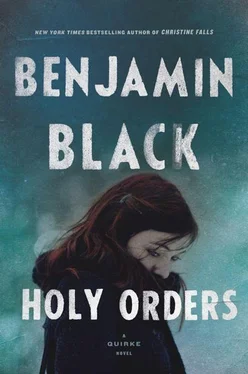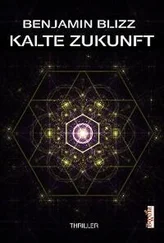Quirke and the detective stepped out into the air. Scuds of rain were blowing across the shadow-skimmed lawn. Feeling suddenly cold, Quirke drew the collar of his overcoat close against his throat. His innards seemed to quiver, as if he had been struck by lightning a moment ago and were still vibrating from the shock.
“Tell me,” he said, “how long was I gone?”
“Oh, five minutes or so.”
“That’s all?”
“About that.”
“Five minutes…”
The policeman was watching him sidelong. “Are you sure you’re all right?”
“Yes, yes. I felt a bit — a bit nauseous, that’s all. It’s passed, now.” They walked towards the car, the wet gravel squeaking under their shoes. “What did he say?”
“Who?”
“The priest, Dangerfield.”
“Not much more than you heard. He was not”—he made a sucking sound with his teeth—“he was not forthcoming, shall we say.”
“What about Jimmy Minor’s letter?”
“That was not to be found. A filing error, according to the good Father Dangerfield.”
Quirke was trying to order his thoughts. It was like wrestling with the wheel of a car that had spun out of control. “And Father Honan is gone off to Donegal, it seems,” he said.
“Is that so? Strange — Father Dangerfield says he’s here, in Dublin.”
Quirke was about to speak again, but said nothing, only frowned.
Detective Sergeant Jenkins was lolling in a bored trance behind the wheel of the squad car. Seeing the two men approach, he straightened hurriedly and started up the engine. Hackett, about to climb into the back seat, stopped and turned and looked up at the gray, forbidding frontage of the house. With the clouds racing above the roof, it seemed for all its bulk to be surging forward massively, almost as if it might topple over onto them, crushing the car and the three of them with it. “Do you ever think,” he said to Quirke, “that some things might be better left undisturbed?”
“What?” Quirke said, as if he had not heard.
Hackett sucked his teeth again. “I have a bad feeling about this business,” he said. “That young fellow’s death, that won’t be the end of it.”
They got into the car, and Jenkins engaged the gears and the big machine rose up off its haunches and lumbered forward, its tires crunching the stones. When it had gone, and the smell of exhaust smoke had dispersed, the blackbird alighted on the lawn again and began to dig with its beak in the rain-soaked loam. From a bough above, a magpie looked down at the questing bird out of glossy, blue-black eyes and stirred one wing, flexing its brittle feathers.
She told herself she was imagining it, yet all the same she could not get rid of the feeling that she was being followed, being followed and watched. More than once, at work, she had glanced up and felt sure that someone in the street outside, among the crowd of passing shoppers, had been looking in at her intently, and had moved on a moment before she lifted her head. In the evenings, on her way home, she would draw to a halt suddenly and pretend to be absorbed in looking into a shop window while scanning the street out of the corner of her eye. At night, before she went to bed, she would turn off the light and stand in the darkness monitoring the pavement below her window. There were usually a few working girls out, loitering under the streetlamp or walking up and down, smoking, eyeing the cars going past, but they were familiar to her, and she paid no heed to them or the men who stopped to bargain with them. She did not see anyone who seemed suspicious, not once; yet the feeling persisted that there was someone out there, someone whose only interest was her.
She was not frightened, not exactly — a little apprehensive, perhaps, but what she felt most strongly was curiosity, and a kind of eager expectancy. It was not the first time she had found herself in this condition. After her friend April Latimer had disappeared someone had watched outside her flat night after night, a shadowy presence under the streetlight. Often she had thought it might be April herself, in trouble and wanting to talk, yet not daring to cross the road and ring the bell. April had died, had been murdered, or so the authorities had concluded; she, though, had never quite believed that April was gone, and could not let go of the wistful hope that her friend might return someday. And now maybe she had come back — maybe it was April who was watching her, shadowing her, waiting for the right moment to reveal herself.
But it was not April.
She was walking over Baggot Street Bridge in the rain. It was Friday, but she had the afternoon off — Mrs. Cuffe-Wilkes was having her hair done, an elaborate and lengthy procedure, which meant the shop had to be closed, for Mrs. Cuffe-Wilkes trusted no one, not even Phoebe, and was not willing to leave her alone with the cash register for an entire afternoon. A wind was blowing along the canal, and just at the crest of the bridge her umbrella turned inside out, and as she struggled with it she dropped her handbag, and someone walking behind her stopped to pick it up for her. The umbrella was difficult to control — the wind was blowing a terrific gale — and one of the spokes nearly poked her in the eye, but at last she got it righted.
“Oh, thank you,” she said, taking the proffered handbag, “thank you!”
She was flustered and felt a little foolish. The young woman who had picked up her bag was about her own age. She wore a plastic raincoat and a green woolen tam with a bobble, from under which waves of red hair, darkened by the rain, flowed to her shoulders. She had a broad face with freckles, her skin was milky white and her eyes were a shade of shining, chestnut brown. Those eyes, the big soft irises flecked with gold, were her most striking feature. The lids were elongated at the outer corners and had a little lift that gave her face an Oriental cast. Phoebe thanked her again, and the young woman smiled, and said it was all right and wasn’t the wind a terror. There was, Phoebe felt, something faintly familiar about her — was she someone she had been at school with, maybe?
The young woman walked on, but had to stop at the traffic lights at the corner where the bank was, so that Phoebe, who had furled the recalcitrant umbrella, caught up with her. Standing side by side, they smiled at each other again. Phoebe felt shy, suddenly, and was surprised to hear herself say, “I’m sorry, but have we met before?” The young woman glanced away. The lights had turned red and the traffic had stopped yet they did not cross, but remained standing on the edge of the pavement.
“No,” the young woman said. She was still looking away. “But I know who you are.”
* * *
They went to a café a few doors up from Searson’s. The window was steamed over, and when they sat down at a table beside it the young woman rubbed a clear circle in the mist and looked out, leaning back and forth to see both ways along the street. Her name was Sally. “Sally Minor,” she said, and smiled.
The waitress came to take their order, but for a moment all Phoebe could do was stare at the young woman before her. Sally Minor ordered a pot of tea and a plate of scones. How peculiar it sounded to Phoebe when she said it— a plate of scones —as if she had asked for a serving of consecrated hosts.
Phoebe’s mind was racing, and she did not know where to begin or how to frame the questions crowding in her head. Perhaps it was just a coincidence of names. But no, Sally Minor had said she knew who Phoebe was, so there must be a connection with Jimmy.
Phoebe was about to speak when the young woman put one hand on the edge of the table and leaned forward and said softly, “Yes — I’m his sister.”
Читать дальше












